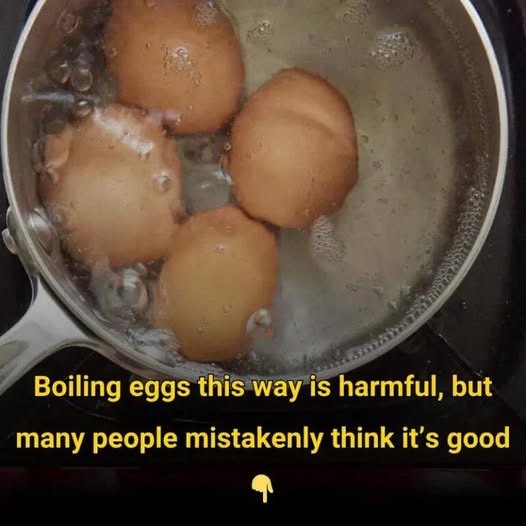
1. Starting with Cold Water
One of the biggest mistakes is placing eggs in cold water and then bringing them to a boil. This can lead to uneven cooking, with some eggs overcooked while others are still too soft inside.
✅ Fix It: Always start with boiling water before adding the eggs. This ensures that they cook evenly and helps prevent the shells from sticking.
2. Using Fresh Eggs
While fresh eggs are great for most recipes, they can be a nightmare to peel when boiled. The lower pH level in fresh eggs causes the whites to cling to the shell, making peeling frustrating.
✅ Fix It: Use slightly older eggs (about a week old) for easier peeling. If you only have fresh eggs, adding a teaspoon of baking soda to the boiling water can help.
3. Boiling Too Long
Overcooked eggs develop a greenish-gray ring around the yolk, which is a sign of excessive sulfur reacting with iron. This can make the eggs rubbery and give them a strong smell.
✅ Fix It: For perfect hard-boiled eggs, boil them for 9–12 minutes, depending on your desired yolk consistency. Soft-boiled eggs take about 6–7 minutes.
4. Skipping the Ice Bath
Not immediately cooling boiled eggs is a major mistake. Without an ice bath, the eggs continue to cook in their residual heat, potentially becoming overdone.
✅ Fix It: As soon as the eggs are done, transfer them to an ice water bath for at least 5 minutes. This stops the cooking process and makes peeling easier.
5. Cracking the Eggs Before Cooling
Some people try to peel eggs before cooling them, leading to frustrating shell removal. Warm eggs have a tendency to hold onto their shells more tightly.
✅ Fix It: Let the eggs cool completely in an ice bath before peeling. Gently rolling them on a hard surface can also help loosen the shells.
6. Not Adjusting for Altitude
If you live at a higher altitude, water boils at a lower temperature, meaning your eggs might be undercooked if you follow standard boiling times.
✅ Fix It: Increase the boiling time by 1–2 extra minutes if you’re at a high altitude to ensure proper cooking.
7. Peeling Eggs Under Dry Conditions
Peeling eggs without any moisture can make it difficult, leaving you with stubborn shell fragments.
✅ Fix It: Peel eggs under running water or in a bowl of water. The water helps separate the membrane from the egg white, making peeling much easier.
Final Thoughts
Boiling eggs the right way is simple once you know what mistakes to avoid. By starting with boiling water, using older eggs, cooling them properly, and adjusting your timing, you’ll always get perfectly cooked eggs that peel with ease.
Now that you know the secrets, it’s time to make the best-boiled eggs ever! 🥚✨









